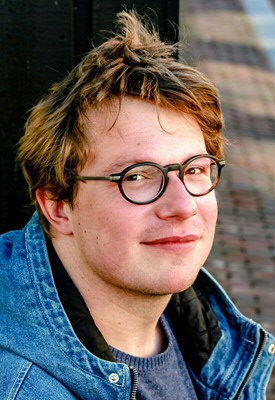Jesse van Amelsvoort: At home in the world of research

Where do you feel at home? When do you feel like you belong, in a world in which we are attached to our own culture, but increasingly part of a larger whole? These questions were at the heart of Jesse van Amelsvoort’s PhD research, in which he analysed the work of six leading authors in minority cultures. He took to it like a fish to water.
Studies in Utrecht, London, Göttingen and Groningen eventually brought Jesse van Amelsvoort to Friesland, and to Campus Fryslân. His interest in anthropology, integration and Europe led him to research in minority cultures. A discrepancy? No, on the contrary, explains Van Amelsvoort. ‘We pass on our culture and tell stories to help us understand the world. However, that world is changing. The idea of the nation state has dominated for two hundred years, but now we see a development towards European integration and globalization. This puts pressure on our cultural or national identity. I saw that it was authors from minority groups who were taking the lead in reflecting on identity, culture and our place in the world. Logical, of course, because minorities have more reason to reflect on identity.’
Own worlds
For his doctorate, Van Amelsvoort examined six authors from European minorities, including the Frisian Tsjêbbe Hettinga and the Moroccan-born Dutch author Hafid Bouazza. His conclusion is that they all six evoke and create their own, very different, worlds in their work. ‘Worlds with their own geography, in which they feel at home, and that have nothing to do with our nation state. I call this “post-national”. These authors are not limited by the borders of a country, but neither are they global citizens who feel at home wherever they are.’
Superdiversity
Whether authors from a minority culture or immigrant authors, Van Amelsvoort believes that the theme is the same. ‘It is about processes of inclusion and exclusion. This can teach us something when we reflect on our society and diversity. Nowadays, people even talk of superdiversity, as your identity is no longer determined by a single criterion. People have different identities, and move in different cultures. This can have practical implications: for example, should you teach a refugee in Fryslân to speak Dutch, or Frisian too?’
Energy from research
One aspect of Van Amelsvoort’s own identity is in any case clear: he is a researcher, a thinker through and through. ‘You see that big bookcase behind me? That is why I carry out research. I love reading, reflecting, formulating ideas. The freedom to think gives me a lot of energy.’ Campus Fryslân provided the ideal surroundings: a new faculty, with lots of young people and the drive and open mind that characterizes pioneers. ‘Colleagues from several different disciplines research language and minority cultures here, which leads to fresh ideas and new perspectives.’
A future at Harvard?
The thesis is almost finished, and the date approaches when he will officially be awarded his doctorate. Surely he will miss it, his research? ‘Well, I think I’m done with this subject for the time being,’ he says laughing, ‘but I am glad that I have gone through this phase, as it has formed me as a thinker. I certainly want to carry on doing research.’ Van Amelsvoort hopes to obtain a Rubicon subsidy, which will take him to Harvard. There, he wants to study the description in literature of people’s awakening and the choices that they make when it comes to climate change and migration. It is his next step in understanding humanity’s place in a changing world.
Text: Eelco Salverda, Communication UG
